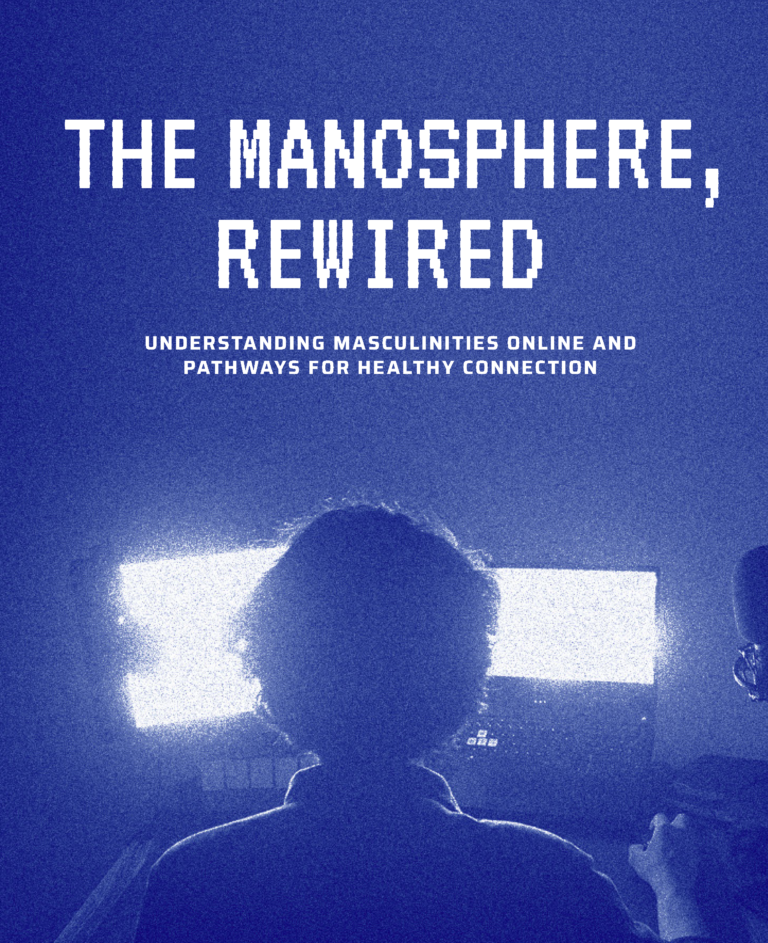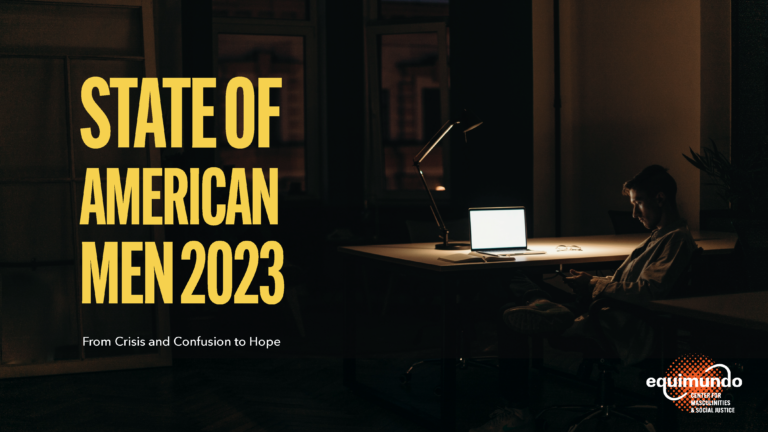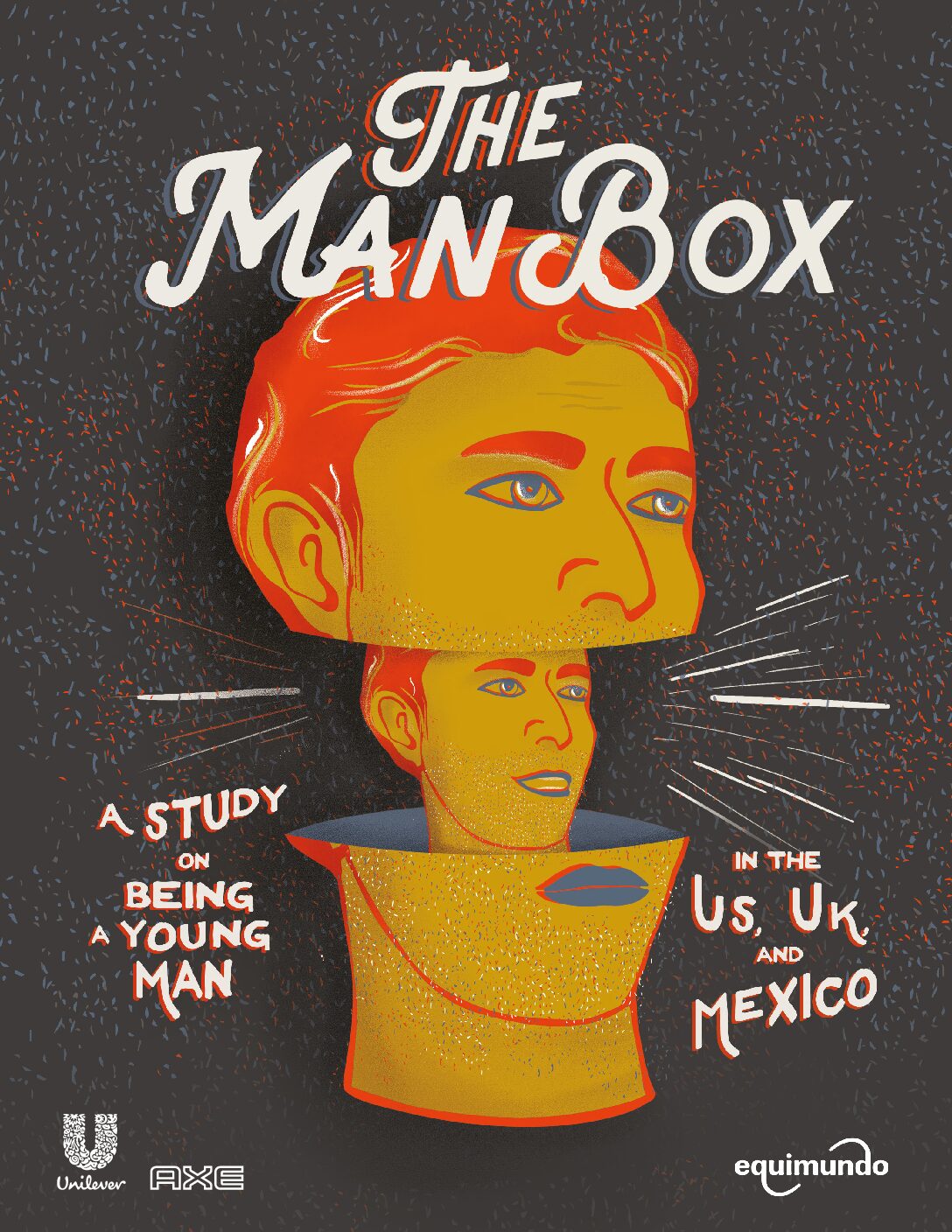The manosphere has successfully leveraged male pain points and digital spaces using strategic messaging that speaks to young men’s lived challenges.
Men’s crisis of connection is the subject of countless headlines. According to our State of American Men 2023 report, two-thirds of young men aged 18-23 feel that “no one really knows” them, revealing a stark and honest fragility of their connections and relationships. At the same time, masculinity itself seems the subject of heated debate, while the term toxic masculinity gets lobbed across the political aisle and ideological spectrum. At its core, the debate about masculinity shows that no one really seems to agree on what a “good man” or “healthy masculinity” looks like. An absence of clear messaging and helpful guidance for men about what they should be like has left many men, particularly young men, turning to the digital world for role models, answers to their questions, and interpersonal connections.
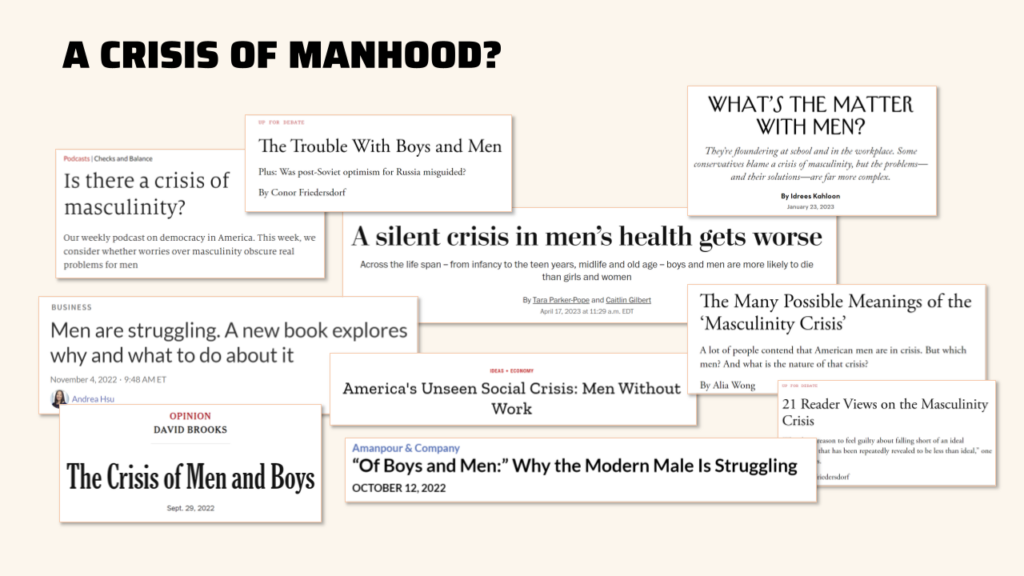
About the manosphere
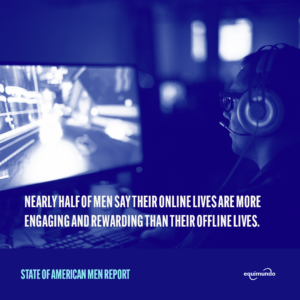
Online spaces – which are now the primary place young men spend their time – have been largely ignored by research on masculinities, until recently.
It’s challenging to overstate the magnitude of how user-generated content is impacting young people’s media consumption habits. In 2023, more time was spent online watching one YouTuber known as Mr. Beast – whose content features elaborate challenges and giveaways – than any of Netflix’s top shows. The entertainment industry has been flipped on its head, with the power resting in individuals to influence narratives more than large studios or traditional media.
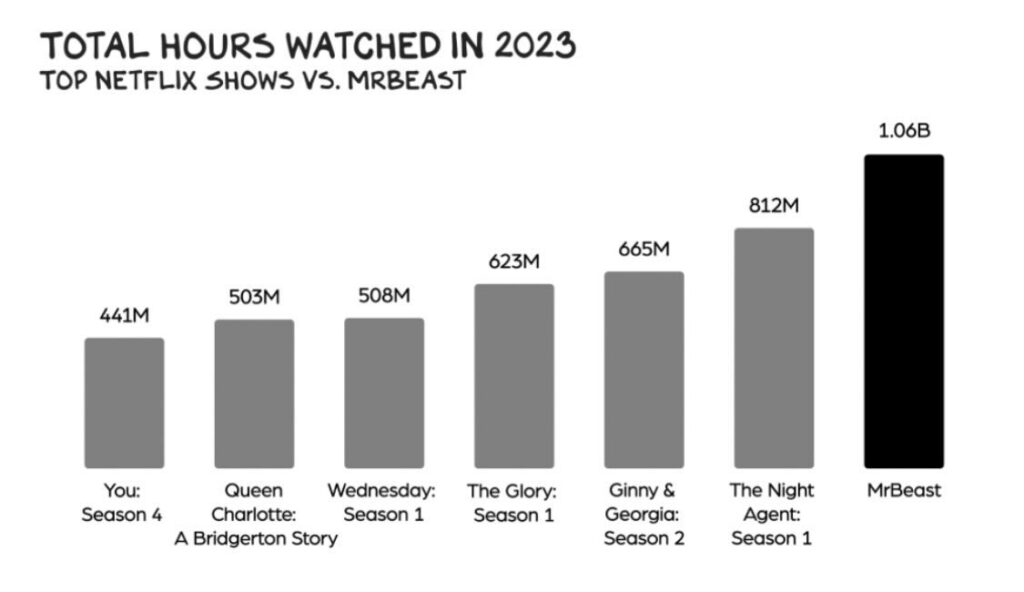
Because men are spending more and more time online, it is essential to understand how the people who hold power over the narrative in these spaces are influencing norms and behaviors. In an effort to understand how those narratives are shaped and the motivations behind the contexts and voices that are capturing male attention, Equimundo researched six of the main platforms young men in the US use, and their experiences encountering narratives around masculinities.
That men seek clarity and connection in the digital world is not inherently harmful and is typically rather innocuous. Our research shows that common search terms and topic areas include dating advice, financial guidance, and fitness content. Yet many men end up funneled into what has become known as the manosphere, a broad collection of websites, forums, and other online spaces characterized by their misogynistic and anti-feminist content, which swoops in with clear messages to help men make sense of a changing world, particularly around gender and gender roles. Many of these spaces exist on platforms like YouTube, Reddit, and TikTok, notably aboveground—increasingly permeating mainstream media—rather than hidden on the dark web.
There is a long trail of manosphere content that extends far longer than the public figures we associate with it. Think of it as a chain of interlinked but distinct groups, espousing a spectrum of ideas: from extreme misogyny on incel forums to more mainstream biological essentialism in dating advice TikToks. The throughline is the notion that men are the new oppressed class, and that women and feminism are to blame for men’s disadvantage. We are seeing an unprecedented scale of more virulent strains of anti-feminist hatred and violence directed at women, facilitated by coordinated gendered disinformation campaigns and algorithmic amplification.
How it works: algorithms and content creators
The manosphere is led by misogynistic influencers who construct a compelling story that frames contemporary social changes as a direct threat to the status and identity of young men using emotionally charged language and imagery designed to provoke fear, anger, and a sense of urgency. Following strict rules, norms, and visual cues, the manosphere tells men what is expected of them in order to be successful and achieve power in society and often, over women.
Manosphere influencers have nailed the messaging and platform optimization to reach young men.
In the attention-driven economy of our hyper-capitalistic world, manosphere content creators are driven by profit. When algorithms incentivize and prioritize extreme and sensationalized rhetoric in order to capture viewers for as long as possible, content creators capitalize on algorithms which will increase their viewership and their profits. Extreme content makes platforms and influencers richer, and without proper regulation, there is no incentive aside from good will for platforms to curtail the proliferation of extremist content.
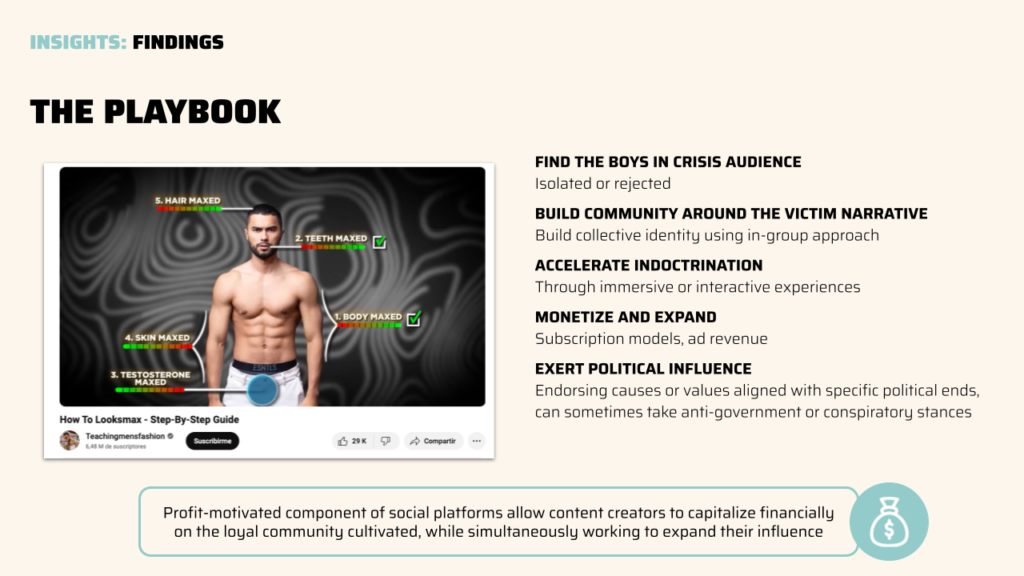
Content creators in the manosphere have perfected platform optimization tactics that exploit young men’s anxieties. Influencers using strategic search engine optimization capitalize on innocent and well-intentioned searches by young men and boys – about dating and relationships, workout routines, or money – in order to direct them to increasingly extreme content for their own financial gain. In a 2024 study conducted by UCL and University of Kent, after only five days of usage, there was a fourfold increase in the level of misogynistic content on the sample TikTok accounts’ “For You” page. Another study from Vodafone revealed that six in ten (69%) boys aged 11-14 have been exposed to online content that promotes misogyny and other harmful views, and 59% of boys are led to this content through innocent and unrelated searches due to AI algorithms.
These online spaces, which have sometimes been treated as trivial, have the capacity to play a serious role in the upcoming US presidential election and subsequently for the state of democracy in the US. Explicit links between how manosphere communities and right-wing figureheads peddle gendered and divisive ideologies can undermine the fundamental democratic principles of equality and social cohesion.
Why does it matter?
Amidst rapid macro-level social, political, and economic changes, young men are turning to the internet and finding community and belonging that speak to their unique identities, interests, and fears. The manosphere fills the messaging void for young men’s questions and insecurities, but has real-world impact offline in terms of violence against oneself and others, mental health, and anti-democratic trends. Here’s how:
- ENABLING CONTEXT: The manosphere creates the enabling context for online misogyny to spread, serving as a way for far-right extremist movements to recruit new followers.
- TARGETED MESSAGING TO FILL A VACUUM: Manosphere influencers have nailed the messaging and platform optimization to reach young men.
- THE “SYSTEM IS RIGGED AGAINST MEN” NARRATIVE: Manosphere narratives frame contemporary social changes as a direct threat to men and sow seeds of mistrust within them. The us-versus-them narratives create deep social divides, eroding the social solidarity essential for a functioning democracy.
- GUNS & VIOLENCE: In more radical spaces, discussion of violence is common. Marketing and glorification of guns is the norm in many of these groups, both as a part of actualized attacks and in the discussions of future violence.
- ANTI-DEMOCRATIC TRENDS: News outlets report that right-wing gendered disinformation – including memes, blogs, and an AI deepfake campaign video – is already being weaponized against Vice President Kamala Harris’s campaign, but the full effects of manosphere messaging on the 2024 election remain to be seen.
Where do we go from here?
We live in a world where the “IRL” and digital spaces blend together, and that’s unlikely to change. But that doesn’t mean the manosphere is impenetrable. Many men show reticence around engaging with these online spaces and voices, and are actively seeking a different kind of Internet. That alone should make us hopeful about the future of online spaces.
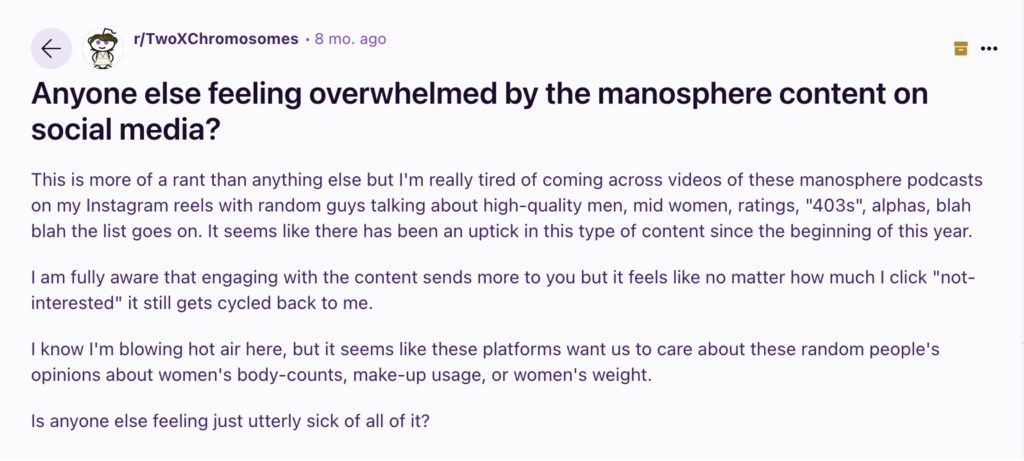
Further reading:
- The Manosphere, Rewired
- State of American Men
- Tips for talking to kids about radical influencers
- The Precarious Online Lives of Young Men
- Alphas, Betas, and Incels: Theorizing the Masculinities of the Manosphere
- Malign Creativity: How Gender, Sex, and Lies are Weaponized Against Women Online
- Polarization, Democracy, and Political Violence in the United States: What the Research Says – Carnegie Endowment for International Peace
- Misogyny, Extremism, and Gun Violence
- Monetizing Misogyny: Gendered Disinformation and the Undermining of Women’s Rights and Democracy Globally

